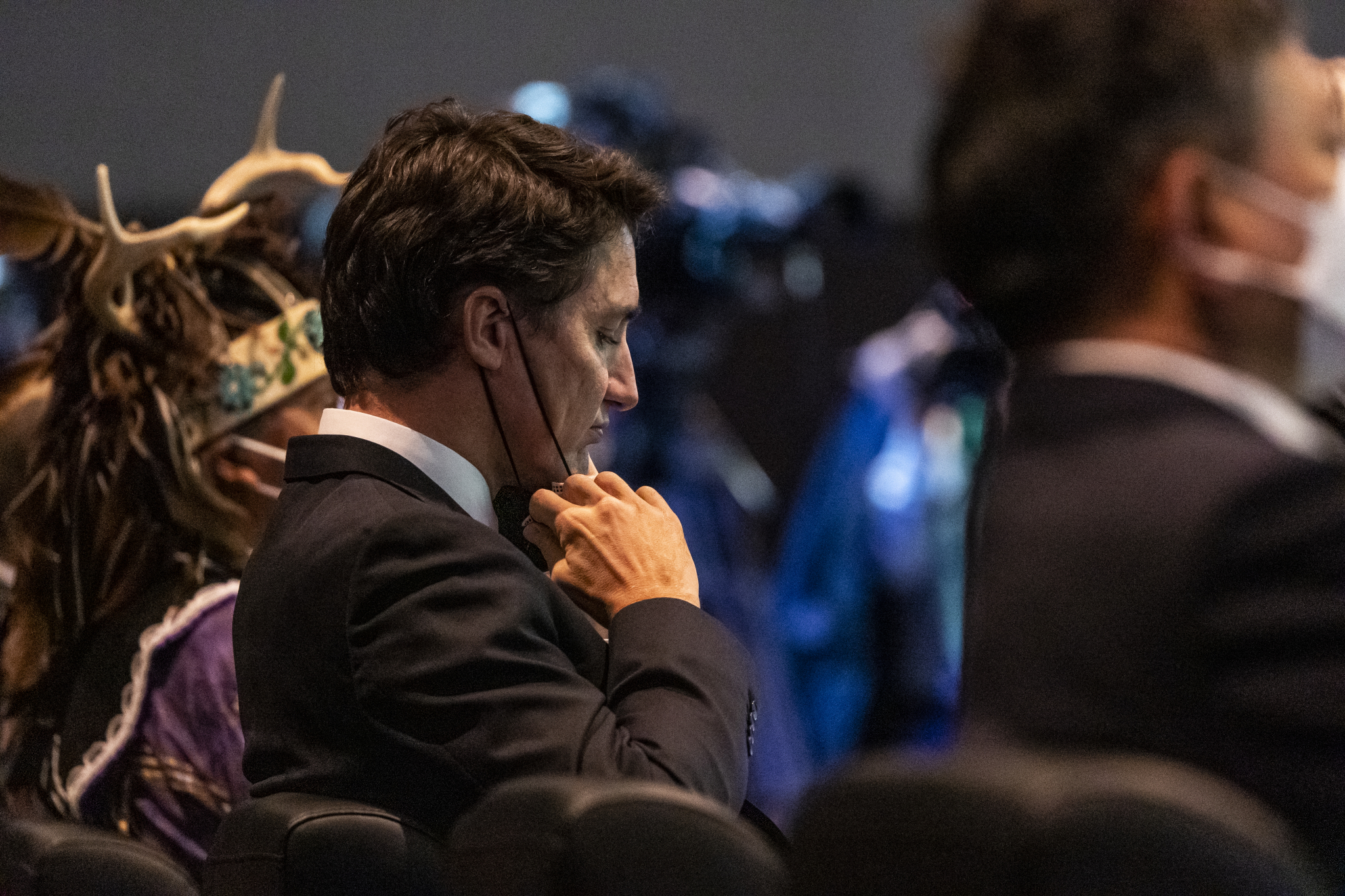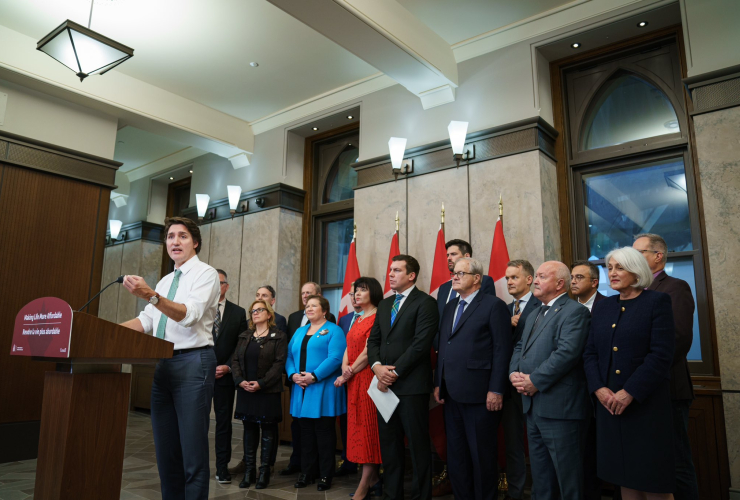In the latest development threatening to upend Prime Minister Justin Trudeau’s signature climate policy, almost half of Canadians want the carbon tax abolished, according to a new poll from Angus Reid.
The polling outfit found 42 per cent of Canadians want the carbon price eliminated altogether. While not technically a majority, the support for the carbon tax has all but disappeared: 25 per cent of Canadians think the price should stay at current levels rather than increasing each year, and 17 per cent think the carbon price should be lowered for the next three years. Only 15 per cent of those polled believe the carbon price should continue as is.
The public’s understanding of the carbon price is the main determinant of support. Eighty per cent of households get more money back through rebates than they pay with a carbon price. Of those who say they receive more than they pay, support for the carbon price reaches 79 per cent. Among those who believe they spend more than they get back, the results are flipped: 82 per cent oppose the tax. The findings imply Trudeau’s government is failing to communicate the benefits in a way the public understands.
Having fallen behind Conservative Leader Pierre Poilievre in polling for months, the findings represent the latest challenge to Trudeau’s popularity. The carbon tax has become a lightning rod for his government. Opposition leaders and right-wing premiers have relentlessly attacked the tax. And in a bid to respond to affordability concerns in Atlantic Canada that threaten re-election prospects in this Liberal stronghold, Trudeau paused the tax on home heating oil there last month.
Since then, Trudeau said there would be no more carveouts and Environment and Climate Change Minister Steven Guilbeault has said there would not be any further exceptions to the carbon tax on his watch. On Thursday, when asked if he would resign if the Senate passed a Conservative private member’s bill extending the carbon price pause to natural gas and propane used by farmers, Guilbeault dodged the question, telling reporters: “We will see what decision the Senate comes to on this bill and act accordingly."
Alberta Sen. Paula Simons, who sits as an independent, told the CBC she’s never been lobbied to this extent before on a private member’s bill, adding: “This bill has become symbolic and it's being used as a wedge issue.”
The Angus Reid findings suggest she may be right. At the same time Canadians are roundly displeased with the carbon price, a recent Ipsos poll also found a majority of Canadians want the federal government to do more to fight climate change and believe Ottawa would be “failing” the public if it didn't go further. That same Ipsos poll found 30 per cent of Canadians across income brackets are willing to pay more income tax to help address climate change.
“The carveout was a strategic blunder that put wind in the sails of opponents raising affordability concerns,” University of Victoria associate professor James Rowe told Canada’s National Observer. “The government could have left the tax untouched while finding other ways of addressing affordability more universally across the country.”
One measure could have been a windfall tax on oil and gas companies, and using the money to lower the cost of living, he said. The Parliamentary Budget Officer found last month that a windfall tax on fossil fuel companies, which made nearly $40 billion in profit last year alone, could bring in $4.2 billion in revenue for the federal government.
But Rowe concedes climate policy is difficult to achieve, and while he supports the carbon tax, it’s far from perfect.
“It basically punishes consumers for fossil fuel use before the alternatives have adequately been built out,” he explained. “I would have preferred more of a public investment approach that would have directed large amounts of government spending to building out alternatives and driving their costs down as the opening gambit, with a possible carbon tax to fund and incentivize the alternatives as a second act.”
Is it any wonder that is the
Is it any wonder that is the case with Poilievre and the right spreading rampant misinformation on a daily basis?
Cases in point:
The Bank of Canada has estimated that the carbon tax increases inflation by 0.15 per cent.
Yet, to hear Poilievre rail on endlessly about this topic - clearly facts don't matter to him as much as media sound bite rhetoric and political anger stoking.
Trevor Tombe, an economist at the University of Calgary who has studied the impact of the carbon price on consumer costs, points to Statistics Canada data that suggests its impact on food prices is less than one per cent. - again, our petro hero is always pardon the pun "harping" on the Carbon tax and its effect on the price of food. In reality if a grocery chain buys an item for 1% less and sells it for $9.99, one would have to be crazy to believe that they would sell it for $9.89 instead in order to pass on the 1% to consumers.
And if they miraculously did, it would have no real tangible or noticeable effect on a cart of groceries.
Lastly, the PBO report on the Carbon Tax (despite its many flaws) actually did say that 80% of us come out ahead. What instead became the right's gospel was much different and that can be traced back to a Toronto Sun editorial piece which is often quoted as the only truth on the matter.
So the 20% who pay more are in all likelihood the highest emitters, and of course the most well to do, and probably not coincidentally leading the political charge to "ax the tax" ie. aiding and abetting the fossil fuel lobby's dirty work which aligns with the CPC political goals.
I don’t know how many times I
I don’t know how many times I need to scream this out into the either, but polls ARE FLAT OUT GARBAGE! I’ve worked for 4 polling companies so I’ve got an indie view of how they work, and they work on Psychology, and word play.
Every polling company makes their money from commissioned polls. Someone comes to them and asks them to conduct a poll. And that individual expects that the poll will reflect their ideas. The companies bring in the psychologist and word experts and craft a series of questions and then put together HOW those questions can be answered.
So right off the bat, Angus Reid in an on line pollster, who have a list of people who have signed up to answer polls, and if after they send you the poll and you don't answer the first two questions they way they want, the poll will thank you, not show you any more questions and close. If you answer the first two questions in the direction that the poll is supposed to go, then you get to answer all of them.
Other polls are done on line and let anyone answer them, but many times an individual can answer that poll over and over again.
And the way in which the questions and answers are framed can force you to answer yes to a question you would normally answer NO to vehemently, simply because the answers don't allow you to give your honest opinion.
Polls are just another way for some people to make money, and for others to use those fake numbers to make you believe whatever they want. Notice just how many polls.are making Trudeau look bad? Remember all those millions of dollars that the Conservatives were spending on TV ads? Well they were also spending that on Polling!
Geez, DO get that information
Geez, DO get that information out somehow, I've never heard or read that before. Twitter seems to be the place to go.
I've found all the poll references irritating because of how many recent elections have proven them to be completely useless.
Prof. Rowe: “It basically
Prof. Rowe: “It basically punishes consumers for fossil fuel use before the alternatives have adequately been built out. I would have preferred more of a public investment approach that would have directed large amounts of government spending to building out alternatives and driving their costs down as the opening gambit, with a possible carbon tax to fund and incentivize the alternatives as a second act.”
Rebates! Rebates! Rebates!
Every time Poilievre says “Axe the tax”, Trudeau & Co. must say "Rebates!"
If the government retains carbon tax revenues, the carbon levy becomes an actual tax. A regressive tax. No rebates, because the government keeps the revenue to "incentivize the alternatives". Something the carbon price does already.
Only now you have government (politicians) picking winners and losers. Which rarely works out well. Inefficient. And opens the scheme up to corruption. Politicians handing out favors to friends.
Carbon pricing and building out alternatives are not mutually exclusive. Carbon pricing provides the incentive and creates the demand to invent, build, and expand options. They need to occur simultaneously. Not one, then the other.
In many cases, more sustainable alternatives are ready to go.
We have public transit, bicycles, and bicycle paths. Let's build more. And make transit a free public good.
We have insulation, energy-efficient windows, passive heating, and heat pumps. Let's install them.
No reason to wait.
Fossil fuel producers and
Fossil fuel producers and consumers use the sky as a free dump. Every smokestack and tailpipe represents an invisible subsidy. Violating polluter-pay and free-market principles.
Carbon pricing gradually prices in (internalizes) the real health and environmental costs of fossil fuels. Pricing goods and services properly is not optional.
Realistic price signals are essential for markets to function properly. Consumers need realistic price signals to guide them towards rational decisions. Realistic price signals price unsustainable goods and services and design — and excessive behavior (consumption, pollution, waste) — out of the market.
We need to price all goods and services properly, including energy. An economic system that permits/ignores/rewards damage to our biosphere dooms us to extinction. Environmental harm must incur a penalty. Where costs are prohibitive, price must reflect that reality.
To transition to a more sustainable economy, the surest way to limit less sustainable goods, services, and design and make the alternatives more attractive is to price the former out of existence.
The speed at which we shift away from fossil fuels largely depends on economic signals. Price in the damage, and fossil fuels become a losing proposition. The fossil-fuel industry, car culture, and urban sprawl must cease to be profitable enterprises.
Until then we subsidize our own destruction.
Climate change is the biggest market failure in history.
Solution? Correct the market failure.
Here's the baffler. The
Here's the baffler. The complaint about governments (well, all bureaucracies, corporations are worse) is that we just get "messaging" instead of results, that the Communications departments keep growing, but not the departments that deliver service.
But this is a massive failure of messaging! 80% of 80% is 64% right there, and the 20% of 20% chips in another 4%, there should be 68% support for the carbon tax. UNLESS people don't know that they are getting back more than they are paying.
That's a media failure, too: they should inform the public of when they can save money.
It is also possible that the
They are taking considerable
They are taking considerable political damage - and the negatives from this may cost them power itself - rather than message that their policy is in fact popular? All because they secretly want their legislation and their administration to fail, out of their ideological support for carbon?
You'll need a whole column to walk me through the logic of that.
It was always a trap that
It was always a trap that Conservatives waited for the Liberals to walk into. It might work if you were dealing with people who actually want to help solve the climate crisis. The Conservatives have always been the subservient to the fossil fuel industry, they were never going to be honest players in this crisis.
The better alternative for the Liberals now is to get together with Biden and do a North American wide inflation reduction act.






Comments